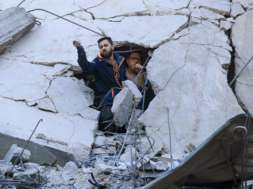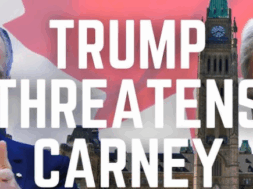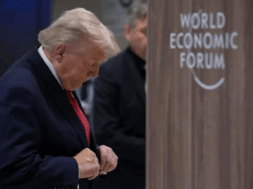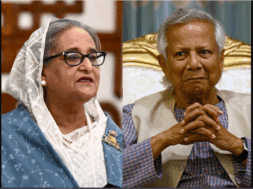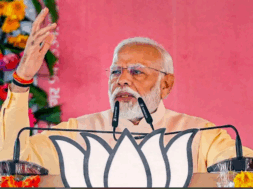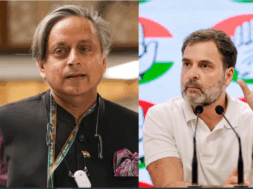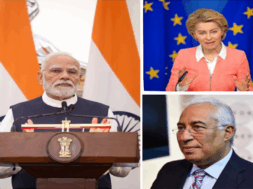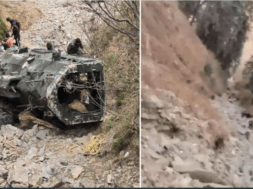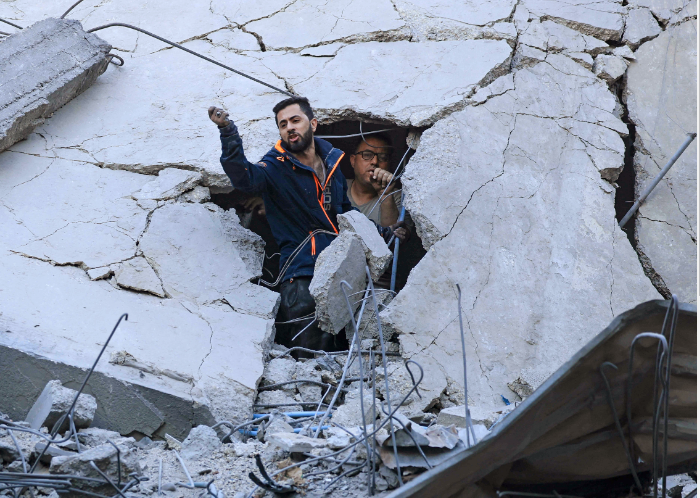
The Gaza War: As Israel penetrates deeper, the UN warns of a humanitarian catastrophe
Virendra Pandit
New Delhi: As Israel penetrated deeper into the Gaza Strip and the death toll mounted amid wanton destruction, the United Nations has warned that “an immediate ceasefire has become a matter of life and death for millions” of the Palestinians.
Philip Lazzarini, who heads the UN agency for the Palestinian refugees, briefed a UN emergency meeting on Monday about the rising humanitarian crisis in the Strip where, of the 2.3 million people, nearly 1.4 million have become internal refugees.
He also accused Israel of “collective punishment” of Palestinians and forced displacement of civilians, the media reported.
Briefings to the UN Security Council (UNSC) by Lazzarini, the head of the UN children’s agency UNICEF and a senior UN humanitarian official, painted a dire picture of the catastrophic humanitarian situation in Gaza 23 days after Hamas’ surprise October 7 attacks inside Israel, and its ongoing retaliatory military action aimed at “obliterating” the terror group, which controls Gaza.
According to the latest figures from Gaza’s Ministry of Health, more than 8,300 people have been killed – 66 percent of them women and children – and tens of thousands injured, the UN humanitarian office said.
In the Hamas invasion, nearly 1,400 Israelis died and hundreds were wounded.
UNICEF Executive Director Catherine Russell said the Gaza toll includes over 3,400 children killed and more than 6,300 injured. “This means that more than 420 children are being killed or injured in Gaza each day – a number which should shake each of us to our core,” she said.
Lazzarini said: “This surpasses the number of children killed annually across the world’s conflict zones since 2019.” And he stressed: “This cannot be ‘collateral damage.’”
Many speakers denounced Hamas’ surprise attacks on Israel that killed over 1,400 people and urged the release of some 230 hostages taken to Gaza by the militants. But they also stressed that Israel is obligated under international humanitarian law to protect civilians and their essential services for life including hospitals, schools, and other infrastructure. They also condemned Israel for blockading food, water, fuel, and medicine to Gaza and cutting communications for several days.
Lazzarini said “the handful of convoys” allowed into Gaza through the Rafah crossing from Egypt in recent days “is nothing compared to the needs of over 2 million people trapped in Gaza.”
US Ambassador Linda Thomas-Greenfield urged the divided UNSC – which has rejected four resolutions that would have responded to the October 7 Hamas attacks and the ongoing war – to come together, saying “the humanitarian crisis in Gaza is growing more dire by the day.”
Stressing that all innocent civilians must be protected, she said the council must call “for the immediate and unconditional release of all hostages, address the immense humanitarian needs of Palestinian civilians in Gaza, affirm Israel’s right to defend itself from terrorism and remind all actors that international humanitarian law must be respected.” She reiterated President Joe Biden’s call for humanitarian pauses to get hostages out, allow aid in, and safe passage for civilians.
“That means Hamas must not use Palestinians as human shields – an act of unthinkable cruelty and a violation of the law of war,” the US ambassador said, “and that means Israel must take all possible precautions to avoid harm to civilians.”
In a sign of increasing US concern at the escalating Palestinian death toll, Thomas-Greenfield told the UNSC that President Biden reiterated to Israeli Prime Minister Benjamin Netanyahu on Sunday “that while Israel has the right and responsibility to defend its citizens from terrorism, it must do so in a manner consistent with international humanitarian law.”
“The fact that Hamas operates within and under the cover of civilian areas creates an added burden for Israel, but it does not lessen its responsibility to distinguish between terrorists and innocent civilians,” she stressed.
Following the rejection of four resolutions in the 15-member UNSC– one each vetoed by the US, Russia, and China, and two for failing to get the minimum nine “yes” votes – Arab nations went to the UN General Assembly (UNGA) last Friday where there are no vetoes.
The 193-member world body adopted a resolution calling for humanitarian truces leading to a cessation of hostilities by a vote of 120-14 with 45 abstentions. Now, the 10 elected members of the 15-member UNSC are trying again to negotiate a resolution that won’t be rejected. While council resolutions are legally binding, the UNGA resolutions are not, although they are an important barometer of world opinion.
